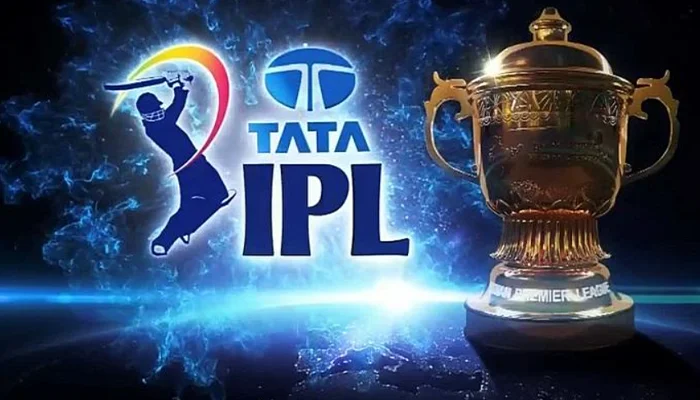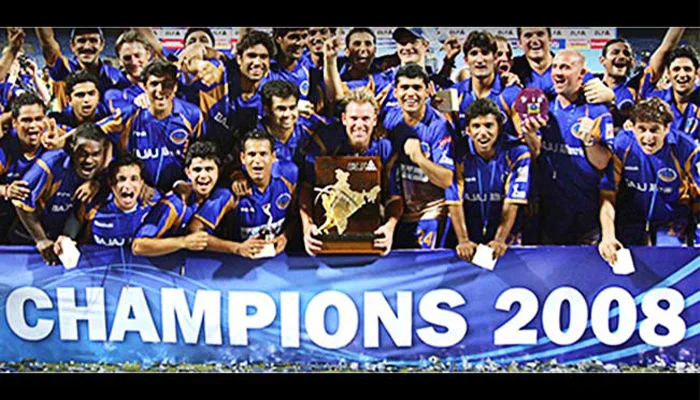Indian Premier League: History Since 1990

(Indian Premier League Logo and Trophy)
Indian Premier League, one of the biggest T20 Leagues around the world made its debut in 2008 in India where Rajasthan Royals defeated the Chennai Super Kings in the first edition to lift the cup. But do you know that the league made its debut after 18 years of the idea proposed to BCCI? Yes, you got it right. Known as the father of IPL, Lalit Modi proposed the idea of the Indian Premier League to BCCI in the 1990s after seeing how cricket has been growing rapidly and it can be used to endorse the game at the highest level. However, what's the entire backstory to this phenomenon, and how has the IPL expanded and flourished over the years? Let's delve deeper into the origins of the IPL and its remarkable journey of growth.
Lalit Modi's Vision of Transforming Cricket into an NBA-Style Spectacle
In the 1990s, Lalit Modi was in North Carolina and was getting associated with Duke University where he developed a deep interest in the National Basketball Association (NBA) and saw how they have developed a tournament where franchises are taking over the International games. Seeing this, Lalit Modi came back to India and started looking for a settled business in the name of creating a competition that would bring cricket to utmost importance in the nation.
Lalit Modi embarked on a mission to reshape cricket in India, inspired by the success of day-night matches during the 1996 World Cup and the burgeoning popularity of cable television. Armed with his experience as the official distributor of ESPN in India, Modi recognized the potential of sports programming to capture viewers' attention. With a goal to make cricket a household staple, Modi proposed a radical concept to the Board of Control for Cricket in India (BCCI): a city-based tournament featuring privately-owned teams, blending Indian and foreign talent.
These matches, played under lights, would receive extensive TV coverage, aiming to dominate prime-time slots. Modi envisioned cricket not just as a sport but as prime-time entertainment, rivalling traditional TV fares like soap operas and movies. His proposal aimed to captivate audiences for four to six weeks annually, establishing cricket as a cultural phenomenon. But, at that time, BCCI wasn’t capable of organizing a tournament that would require so much money and wasn’t even keen on taking cricket to the next level in India and hence the idea was dropped by the organization.
2008: The Year of Innovation - BCCI Introduces the IPL
When the idea of IPL was dropped in the 1990s, Lalit Modi at that time wasn’t holding any major position in the BCCI and hence had no power with him. But in 2007, Lalit Modi was holding the position of Vice President of the Board of Cricket Control in India and hence had the power to take Indian cricket to the next level. Moreover, the introduction of the T20 format made the things easier for the board and with India lifting the maiden T20 World Cup, things aligned and hence the BCCI decided to introduce a league where all the matches will be played in the T20 format and in the evening, it will prove to be a proper entertainment package for the cricket lovers.
The inaugural IPL season in 2008, hosted by India, showcased eight teams split into two groups. These fast-paced and exhilarating matches unfolded across various Indian cities, captivating cricket fans with their electrifying action. Beyond the group stage, the top four teams advance to the playoffs, amplifying the stakes as teams vie for a coveted spot in the final showdown. This strategic playoff stage adds another layer of excitement, setting the stage for memorable moments and intense battles on the field.
With the introduction of IPL in 2008, the IPL Auction for the teams took place where a total of eight teams were bought with the draft methods. On January 24, 2008, the IPL team auctions made headlines as team ownership went under the hammer. With a base price set at US$50 million per team, the auctions raked in an impressive total of US$723.59 million, well exceeding the initial US$400 million estimate. The Mumbai team emerged as the most expensive, fetching over US$111.9 million.
|
Team |
City |
Franchise Owner(s) |
Cost (in US$ millions) |
|
Royal Challengers Bangalore |
Bangalore |
Vijay Mallya's United Spirits |
111.60 |
|
Chennai Super Kings |
Chennai |
India Cements |
91.00 |
|
Delhi Daredevils |
Delhi |
GMR Group |
84.00 |
|
Deccan Chargers |
Hyderabad |
Deccan Chronicle |
107.00 |
|
Rajasthan Royals |
Jaipur |
Emerging Media-led consortium |
67.00 |
|
Kolkata Knight Riders |
Kolkata |
Shah Rukh Khan's Red Chillies Entertainment |
75.09 |
|
Kings XI Punjab |
Mohali |
Preity Zinta, Ness Wadia, Karan Paul and Dabur's Mohit Burman |
76.00 |
|
Mumbai Indians |
Mumbai |
Mukesh Ambani's Reliance Industries |
111.90 |
However, controversy arose over potential conflicts of interest, notably with then BCCI secretary N. Srinivasan's involvement in the Chennai team, sparking debate within the cricketing community. Despite the controversies, the auctions marked a significant milestone in IPL history, setting the stage for the league's rise as one of the most lucrative and popular cricket tournaments globally.
With the teams decided it was the time for players to get selected for their respective teams. A separate auction was carried out for the players in a total of 5 phases. Firstly, the icon players were sold out where they received a 15% sum more than the other players. Virender Sehwag, Sachin Tendulkar, Rahul Dravid, Yuvraj Singh, and Sourav Ganguly were sold to the respective teams as icon players here. After this, the first set of players were sold in the auction and some big players like MS Dhoni, Shane Warne, Adam Gilchrist, and many others got to the big teams.

(Rajasthan Royals celebrating after winning the IPL trophy in 2008)
Just like this, another set of players came up and they got the teams for the IPL season and at the end, it was the draft of under-19 players where stars like Virat Kohli, Ravindra Jadeja and others were sold. Now coming to the players that were unsold or weren’t able to get their name in the auction, they got the teams through signings apart from the auction. The IPL 2008 season was of just 59 matches and it was the Rajasthan Royals that came out as the winners in the finals against the Chennai Super Kings.

Comments
Sign up or log in to your account to leave comments and reactions
0 Comments